The Ultimate Local Auto Diagnostics Service Finder
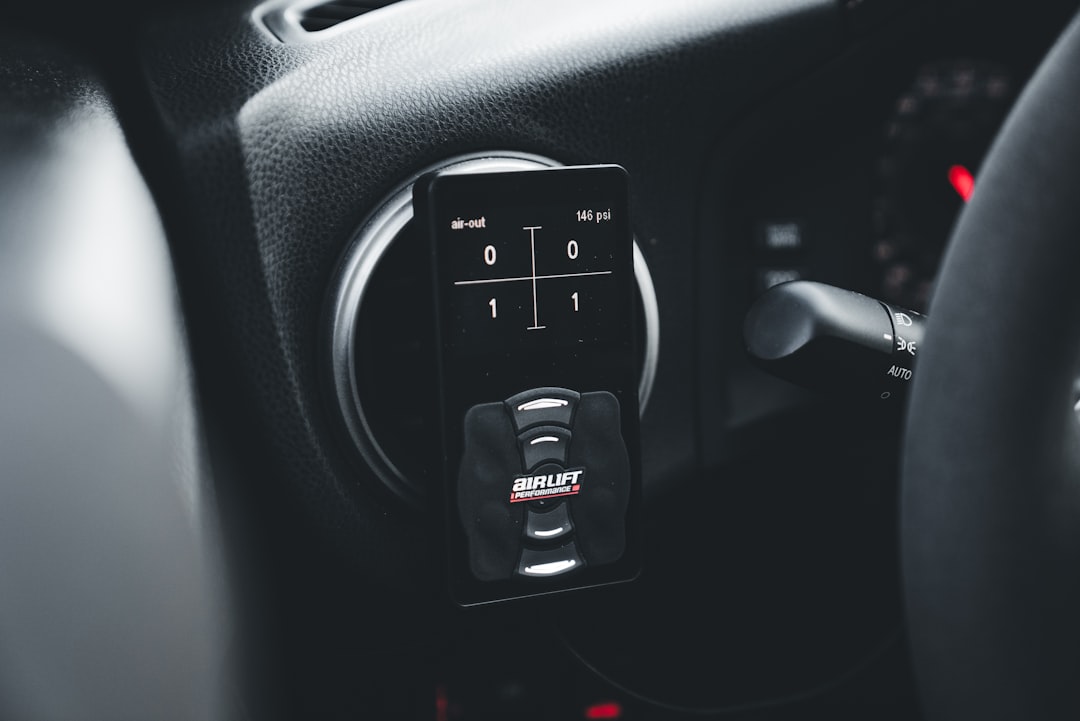
Why Modern Vehicles Need Professional Auto Diagnostics Service
An auto diagnostics service is essential for maintaining your vehicle's health in today's tech-driven automotive world. Here's what you need to know:
What is an auto diagnostics service?
- Professional testing using specialized computer tools to identify vehicle problems
- Reads fault codes from your car's onboard computer system
- Pinpoints issues with engine, transmission, brakes, and electrical systems
- Provides a clear repair plan based on accurate testing
When do you need it?
- Dashboard warning lights appear (check engine, ABS, battery)
- Vehicle performance issues (stalling, rough idling, poor acceleration)
- Unusual noises, smells, or vibrations
- Annual preventive maintenance check-ups
- Before major repairs to avoid guesswork
Average time: 30 minutes to 1.5 hours depending on complexity
Modern cars contain more technology than ever. As one expert put it: "Auto Diagnostics is taking a picture of the health of your vehicle." Your car's computer system monitors numerous sensors, storing fault codes when problems arise.
Like a medical check-up, these tests can catch small issues before they become expensive repairs. The alternative—guessing or "parts swapping"—often costs more time and money without solving the root problem.
Unlike basic consumer code readers, professional services use advanced equipment and skilled technicians who know fault codes are just the starting point. The real value comes from experienced mechanics who interpret these codes and perform detailed testing to find the actual cause.
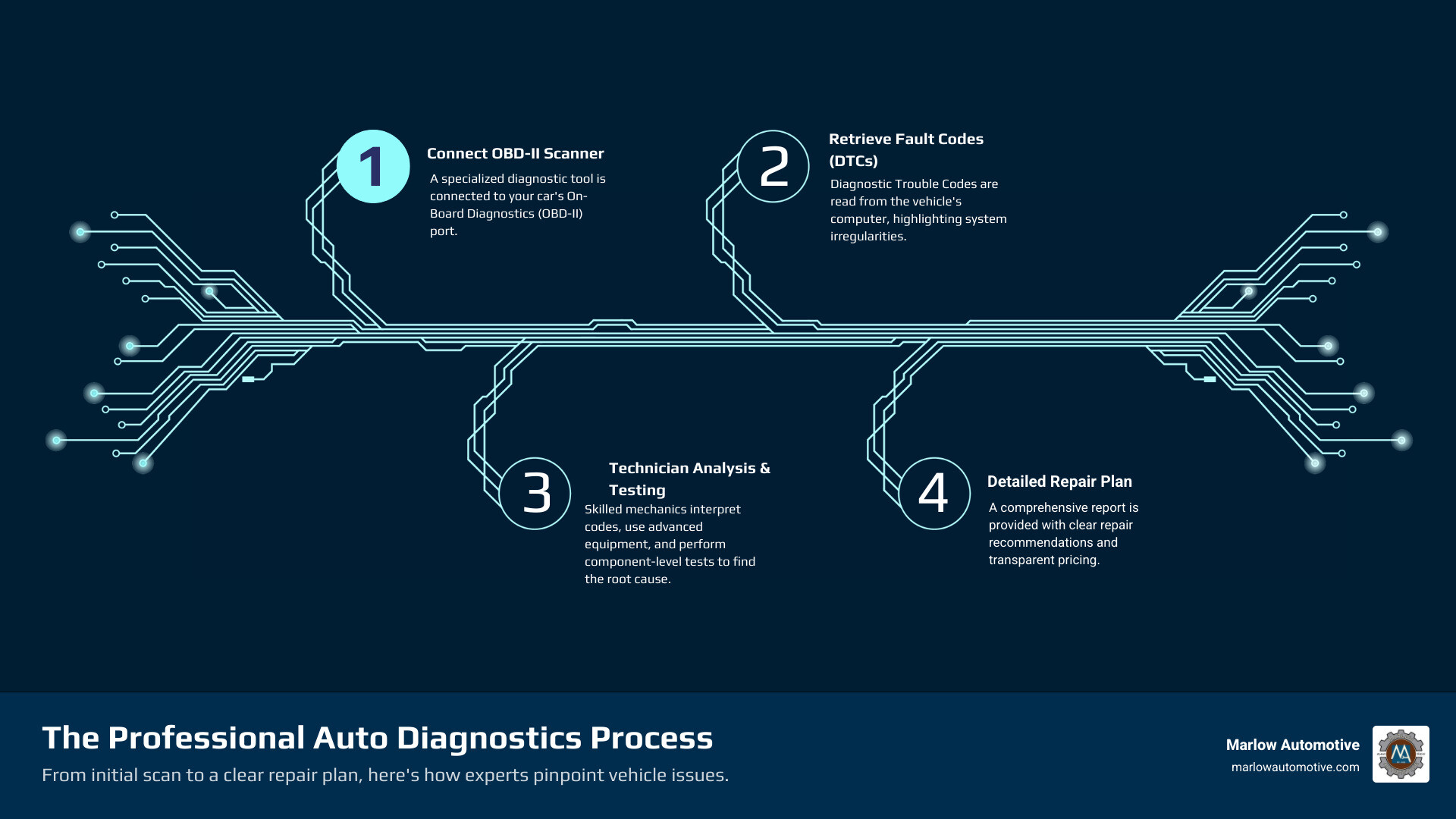
Decoding Your Dashboard: When to Seek an Auto Diagnostics Service
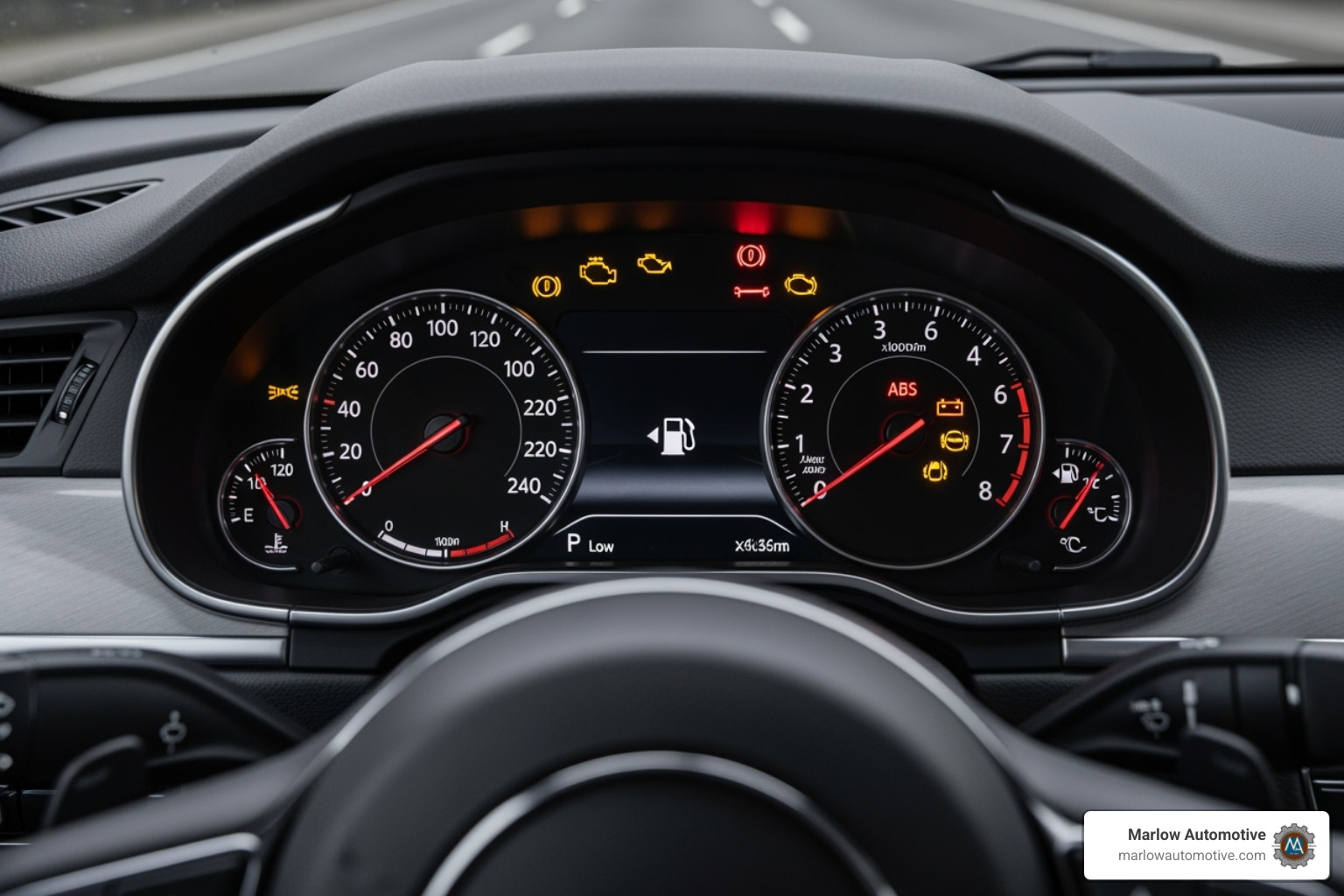
Your car's dashboard is its way of talking to you. When warning lights glow, it's time for a professional auto diagnostics service. Think of it as a check-up for your car—it's always better to catch problems early. Ignoring these signals can turn a small issue into a major breakdown, and a simple diagnostic check can prevent you from being stranded.
Common Dashboard Warning Lights Explained
Your dashboard speaks its own language, and learning to understand it can save you time, money, and frustration. Here's what those mysterious lights are trying to tell you.
The check engine light is the most common warning. It can mean anything from a loose gas cap to a serious engine problem. If it's steady, schedule a diagnostic appointment. If it's flashing, it's an emergency, often an engine misfire that could damage your catalytic converter. Pull over and get help immediately. Our check engine light services can decode the issue.
The battery alert light signals trouble with your charging system, like a failing alternator or bad connections. Ignoring this light often leads to being stranded with a completely dead battery.
When the oil pressure light appears (it usually looks like an old-fashioned oil can), your engine isn't getting the lubrication it needs. This could be as simple as low oil levels or as serious as a failing oil pump. This is one of those lights you really don't want to mess around with – engines can seize up quickly without proper oil circulation.
The engine temperature warning light means your engine is running too hot. If this light comes on while you're driving, pull over safely and shut off the engine right away. Overheating can cause thousands of dollars in damage in just a few minutes.
Your tire pressure monitoring system (TPMS) light shows up when your tires aren't properly inflated. It looks like a flat tire with an exclamation point inside. Sometimes it's just cold weather affecting your tire pressure, but it could also mean you have a slow leak or a faulty sensor.
The ABS light warns you about problems with your anti-lock braking system. Your regular brakes should still work, but you won't have that extra safety feature that prevents wheel lockup during emergency stops. Don't put off getting this checked – your safety depends on reliable brakes. We offer expert ABS repair to get your braking system back to peak performance.
Other Telltale Signs You Need a Diagnostic Check
Dashboard lights aren't the only way your car asks for help. Sometimes it uses sounds, smells, or performance changes to get your attention.
Strange noises are your car's way of clearing its throat before speaking up about a problem. A knocking sound from the engine could mean serious internal issues. Squealing noises often point to worn brake pads or loose belts. Grinding sounds? That's usually your brakes telling you they're worn down to the metal – definitely time for immediate attention.
Poor performance shows up in various ways. Maybe your car hesitates when you press the gas pedal, or it stalls at red lights. Perhaps you're visiting gas stations more often because your fuel efficiency has taken a nosedive. These symptoms often point to issues with your engine, fuel system, or emissions controls.
Fluid leaks under your parked car are never a good sign. Different colored puddles tell different stories – dark brown or black usually means oil, bright green or orange typically indicates coolant, and red fluid often signals transmission or power steering problems. Any leak deserves professional attention.
Difficulty starting your car can stem from various causes. Maybe the battery is weak, the starter is failing, or there's a problem with the fuel system. Rather than playing guessing games, a proper diagnostic can pinpoint the exact issue.
Rough idling makes your car shake or vibrate when you're stopped at traffic lights. This usually means something's off with your engine's combustion process – could be spark plugs, fuel injectors, or other components.
Unusual smells are another red flag. The sweet smell of coolant might mean a leak in your cooling system. Burning oil creates a distinct acrid odor. And that rotten egg smell? That's often a failing catalytic converter talking.
Instead of guessing what's wrong or swapping parts and hoping for the best, bring your vehicle in for a professional auto diagnostics service. Our experienced team can handle everything from minor issues to major engine repair needs, giving you the peace of mind that comes with knowing exactly what's happening with your car.
The Diagnostic Deep Dive: From Code to Cause
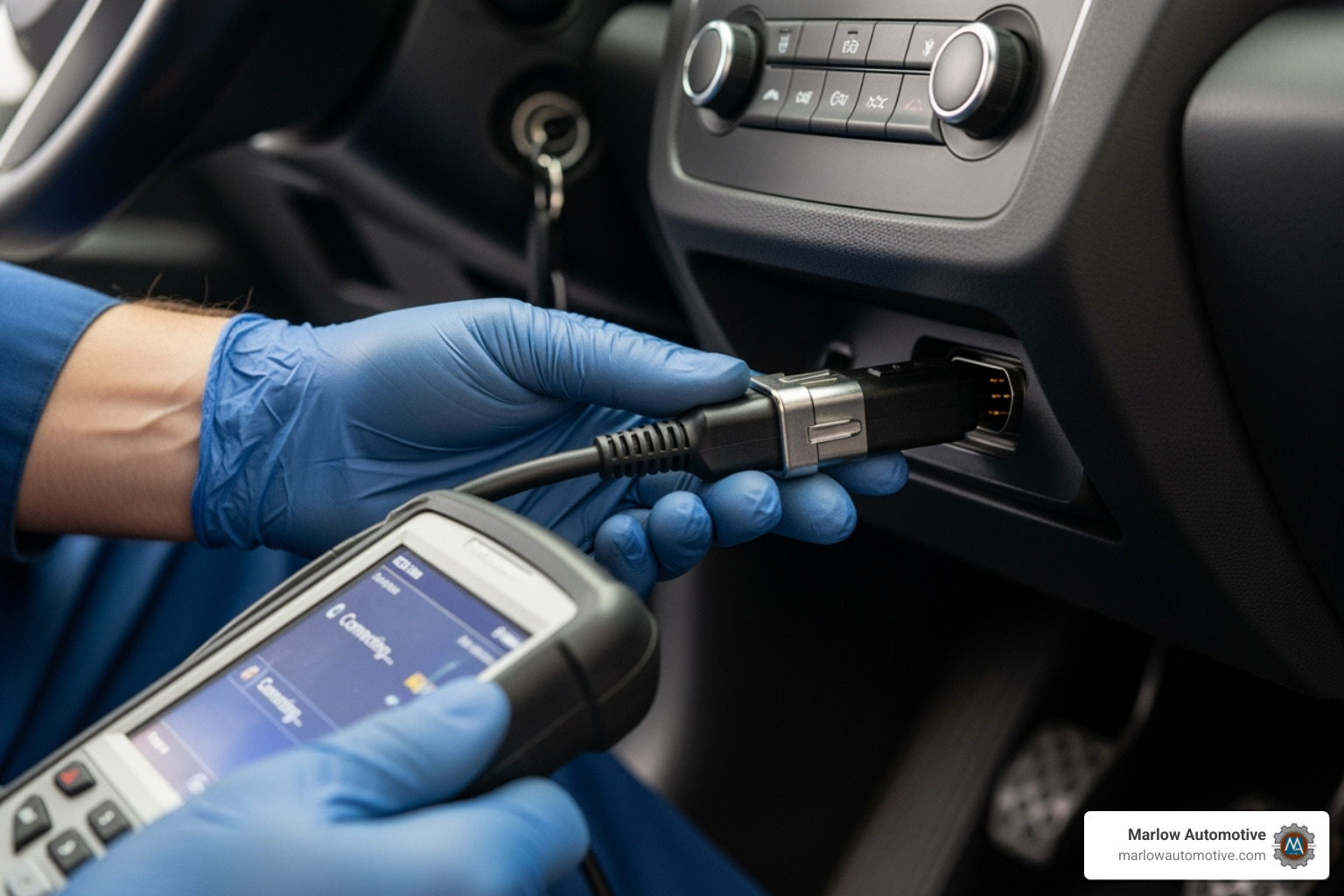
Getting to the bottom of your car's problem is like solving a mystery. When you bring your vehicle in for an auto diagnostics service, we don't just guess what might be wrong. Instead, we follow a careful, step-by-step process that combines high-tech tools with good old-fashioned detective work.
Think of it this way: if you went to the doctor with a headache, they wouldn't immediately perform brain surgery. They'd ask questions, run tests, and figure out the real cause first. That's exactly what we do with your car.
Step 1: The Initial Scan and Code Retrieval
Every diagnostic journey starts with connecting our professional diagnostic scanner to your car's OBD-II port. This little port, found in every car made after 1996, is like a window into your vehicle's brain. Through it, we can "talk" to your car's computer systems and retrieve what we call Diagnostic Trouble Codes (DTCs).
These codes are your car's way of saying "Hey, something's not right here." But here's the thing - and this is crucial - these codes are symptoms, not solutions.
For example, a code P0301 indicates a misfire in cylinder 1. This doesn't tell us why it's misfiring—it could be a worn spark plug, a clogged fuel injector, or a wiring problem. The code points us in the right direction, but the real detective work is just beginning.
This is why those cheap code readers you can buy online often leave people frustrated. They'll tell you there's a problem, but they won't tell you how to fix it.
Step 2: Analysis and Pinpoint Testing
Once we have the codes, our certified technicians roll up their sleeves and get to work. This is where years of training and experience really matter. We don't just throw parts at the problem and hope something sticks.
First, we verify the fault. Can we recreate the problem? Does the car still show the same symptoms? Sometimes codes can be old or intermittent, so we want to make sure we're chasing the right issue.
Next comes component testing. Using specialized tools like multimeters, oscilloscopes, and even smoke machines (yes, really!), we test each part that could be causing the problem. For that cylinder misfire, we might check the spark plug, ignition coil, fuel injector, and even measure cylinder compression.
We also do thorough wiring inspection. Modern cars have miles of wiring, and a single broken or corroded wire can cause all sorts of headaches. It's tedious work, but it's often where we find the real culprit.
Our technicians also check Technical Service Bulletins (TSBs) - these are notices from car manufacturers about known issues and their solutions. Sometimes what seems like a mysterious problem is actually a common issue with a well-documented fix.
This methodical approach is what sets our auto diagnostics service apart. We're not guessing - we're testing, verifying, and confirming until we find the root cause.
Step 3: The Clear Repair Plan
A diagnostic test is different from a repair. The diagnostic finds the problem; the repair fixes it, much like the difference between an X-ray and surgery.
Once we've identified the real issue, we create a detailed report for you. No confusing technical jargon - just a clear explanation of what's wrong and what it'll take to fix it. We often include photos so you can see exactly what we're talking about.
We also provide prioritized recommendations. Some repairs need to happen right away for safety reasons. Others can wait a bit if your budget is tight. We'll help you understand the difference so you can make informed decisions.
Finally, you'll get transparent pricing with no surprise fees. We believe in constant communication throughout the process. You'll know exactly what you're paying for and why it's necessary.
This approach saves you money in the long run by avoiding the expensive "parts swapping" game where shops replace components until something works. Instead, we invest the time upfront to get it right the first time, getting you back on the road safely and confidently.
Why Expertise and Advanced Equipment Matter
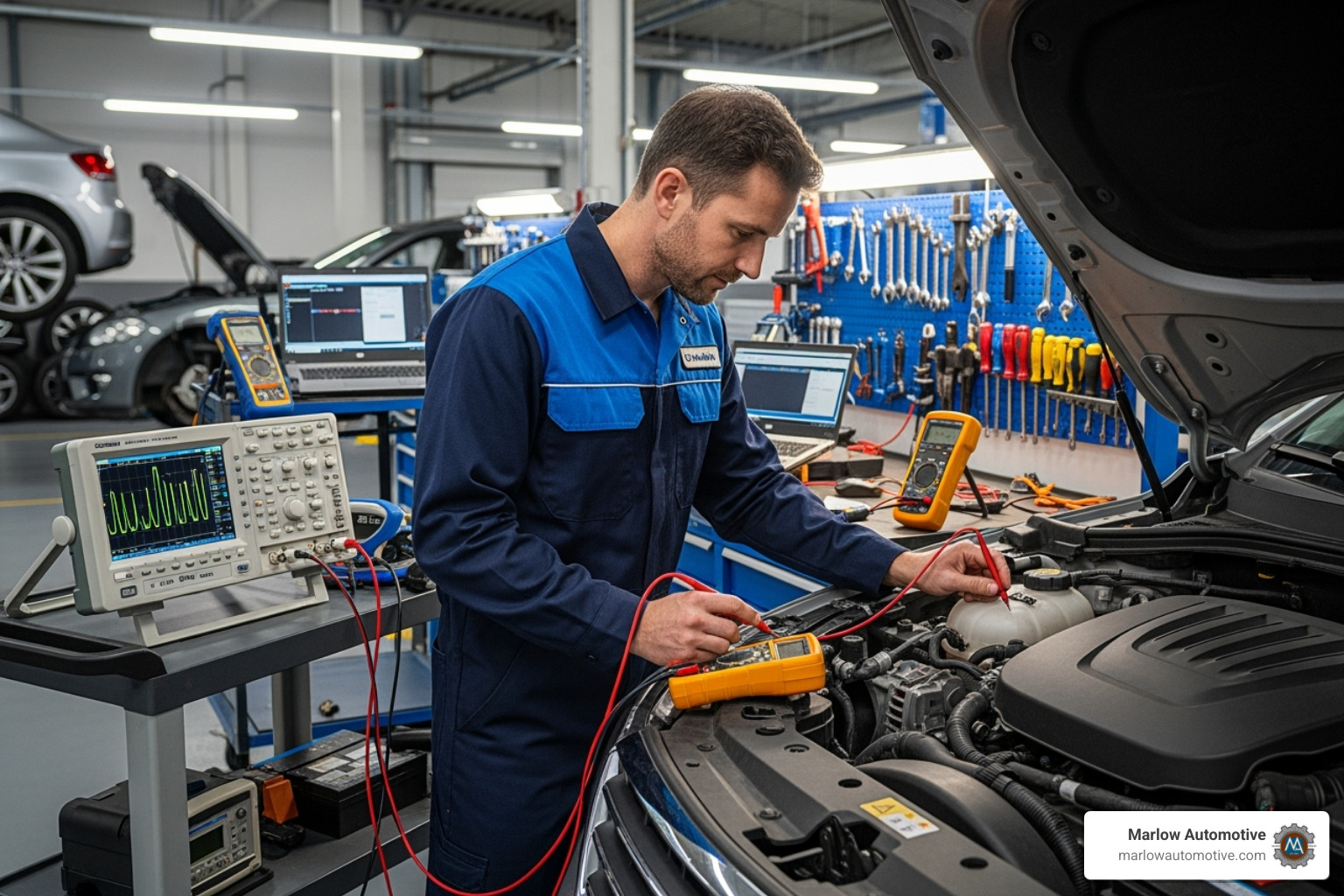
Your neighbor's $30 code reader can't compare to a professional shop that has invested thousands in diagnostic equipment and technician training. Which do you think will actually solve your problem?
Modern cars aren't just cars anymore - they're computers on wheels with more processing power than the first space shuttles. This complexity means that getting an accurate auto diagnostics service requires both cutting-edge equipment and the expertise to use it properly.
The difference between a basic code reader and professional diagnostics is like comparing a thermometer to a full medical examination. Both might tell you something's wrong, but only one will tell you exactly what to do about it.
The Tools of the Trade
Walk into our diagnostic bay, and you'll see equipment that looks like it belongs in a high-tech laboratory. That's because modern vehicle diagnosis requires advanced scan tools that go far beyond simple code reading. These professional-grade scanners can actually command your car's systems, watch live data streams, and perform complex tests that basic readers simply can't handle.
We use manufacturer-specific software because every car brand speaks its own language. A Honda needs different diagnostic conversations than a BMW, and generic tools often miss the nuances that lead to accurate repairs.
Our oscilloscopes let us literally see electrical signals as they happen - imagine watching your car's heartbeat in real time. When a sensor is acting up intermittently, this visual approach often reveals problems that traditional voltage tests completely miss.
Multimeters might look simple, but the advanced versions we use can measure electrical values with surgical precision. Sometimes the difference between a good component and a failing one is just a few millivolts.
For those sneaky vacuum leaks that can drive you crazy with poor performance, our smoke machines make the invisible visible. We introduce harmless smoke into the system, and suddenly that tiny crack that's been causing problems shows up clear as day.
We invest in the most up-to-date diagnostic technology because your car deserves nothing less. When electrical gremlins strike, our comprehensive auto electrical services have the tools and expertise to track them down.
The Importance of a Professional Auto Diagnostics Service
Here's what really matters: having the right tools is only half the battle. The other half is having technicians who know how to use them effectively.
Our team includes ASE Certified Technicians - that's like having board-certified doctors for your car. These certifications aren't just wall decorations; they represent proven expertise and a commitment to staying current with automotive technology.
Continuous training is essential because car technology changes faster than smartphone apps. What worked on last year's models might be completely different on this year's vehicles. Our technicians regularly update their knowledge to handle the latest systems and diagnostic procedures.
Experience across makes and models means we've seen it all. Whether you drive a domestic truck, a Japanese sedan, or a European luxury car, we understand the unique quirks and common issues that affect each type of vehicle.
Modern vehicles integrate dozens of computer systems that all talk to each other. Your engine computer chats with your transmission, which coordinates with your ABS system, which connects to your airbag controller. When something goes wrong, it often affects multiple systems. Our technicians understand these complex relationships and can trace problems through the entire network.
Most importantly, ensuring safety and reliability is our top priority. Accurate diagnostics mean your safety systems work when you need them, your car starts reliably, and you can trust your vehicle to get you and your family where you need to go.
At Marlow Automotive, we believe expert care should exceed what you'd get at a dealership - but without the dealership price tag or attitude. When you choose our auto diagnostics service, you're investing in accuracy, honesty, and repairs done right the first time.
The Financial and Performance Benefits of Proper Diagnostics
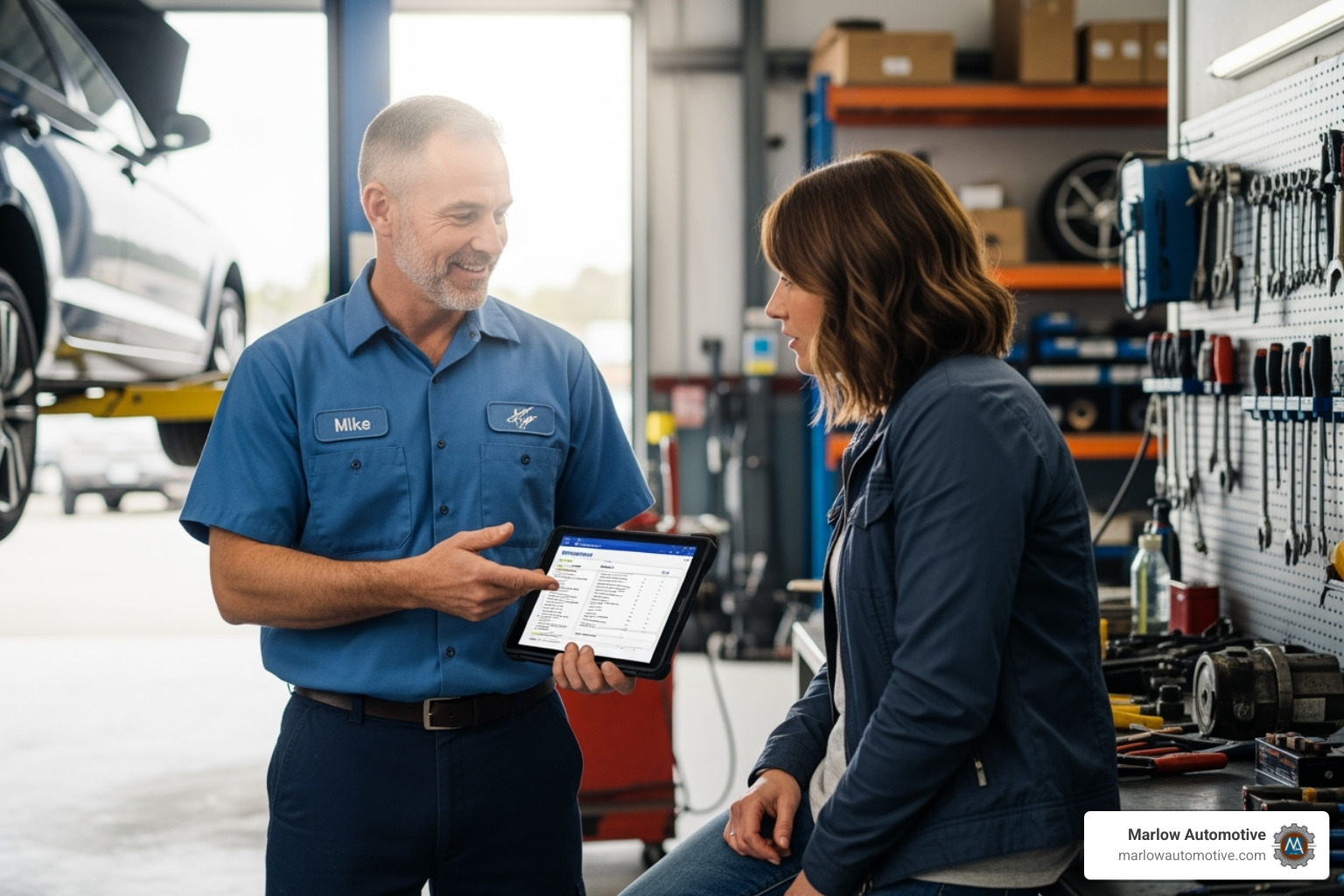
A professional auto diagnostics service is a smart investment in your vehicle. Like an early health diagnosis, identifying car problems before they escalate can save you hundreds or even thousands of dollars.
Saving Money and Preventing Unnecessary Repairs
The biggest financial benefit of proper diagnostics? Avoiding the expensive guessing game. Without accurate testing, some shops resort to what we call "parts swapping" - basically throwing parts at your car until something works. This approach is not only frustrating but incredibly costly.
Imagine your check engine light comes on. Without proper diagnostics, a shop might replace the oxygen sensor first, then the catalytic converter, then the fuel injector - all while you're paying for parts and labor each time. A thorough diagnostic test would have pinpointed the actual problem from the start, saving you from unnecessary repairs and multiple trips to the shop.
Early detection is your wallet's best friend. A failing sensor caught during routine diagnostics might cost $150 to replace. Ignore it, and that same sensor could cause your catalytic converter to fail, leading to a $2,000 repair bill. Regular diagnostic check-ups through our auto maintenance services help catch these issues while they're still manageable.
First-time accuracy means you're not paying twice for the same problem. When we use our advanced diagnostic equipment to identify the root cause correctly the first time, you avoid the frustration and expense of return visits for the same issue.
Improved Vehicle Performance and Fuel Efficiency
Beyond saving money, accurate diagnostics can transform how your car feels and performs on the road. Restored performance means getting back that smooth acceleration and responsive handling you remember when your car was newer. Issues like engine misfires or transmission problems don't just make your car feel sluggish - they can actually be dangerous in situations where you need quick acceleration or reliable power.
Better fuel economy is one of the most noticeable benefits of proper diagnostics. A faulty oxygen sensor can make your engine burn fuel inefficiently, essentially throwing money out your tailpipe. We've seen customers improve their gas mileage by 15-20% simply by identifying and fixing sensor issues that were causing their engine to run rich.
Increased vehicle longevity happens when all your car's systems work in harmony. When one component fails, it often puts extra stress on other parts. A clogged fuel filter, for example, makes your fuel pump work harder, potentially shortening its life. By catching and fixing problems early, diagnostics help protect your entire vehicle investment.
The diagnostic fee covers our specialist's time, advanced equipment, and technical expertise - all of which provide you with a clear repair plan instead of costly guesswork. It's not just about fixing what's broken; it's about keeping everything running smoothly so you can depend on your car for years to come.
Frequently Asked Questions about Auto Diagnostics
When your car acts up, you have questions about auto diagnostics service. Let's clear up the most common concerns.
How often should my vehicle have a diagnostic check?
Think of diagnostic checks like your annual physical – even when you feel fine, it's smart to make sure everything's working properly under the hood. We recommend getting your vehicle checked at least once a year, even if no warning lights are glowing at you from the dashboard.
This proactive approach isn't just good for your car's health; it's good for your wallet too. Catching small issues before they turn into big, expensive problems is one of the best investments you can make in your vehicle.
But don't wait for your annual check-up if your car is trying to tell you something. You should definitely bring your vehicle in for an auto diagnostics service when any dashboard warning light appears – whether it's the check engine light, ABS light, or battery warning. These lights are your car's way of asking for help.
Other times to schedule a diagnostic check include when you're experiencing performance issues like hesitation, stalling, or rough idling. Strange noises, unusual smells, or that "something just doesn't feel right" feeling are also good reasons to come in.
And here's a pro tip: if you're considering purchasing a used car, a pre-purchase diagnostic can be a real lifesaver. It can uncover hidden issues that might not be obvious during a test drive, potentially saving you from buying someone else's problem.
Why is there a fee for a diagnostic test?
This is probably the question we hear most often, and it's completely understandable. When you're already facing a car problem, another expense can feel frustrating. But here's the thing – a diagnostic fee isn't just another cost; it's an investment that actually saves you money in the long run.
When you pay for our auto diagnostics service, you're getting much more than just someone plugging in a code reader. You're paying for our specialist's time – sometimes up to an hour or more – as they carefully analyze your vehicle's symptoms and perform detailed testing to get to the root of the problem.
You're also paying for access to advanced equipment that goes far beyond what you can buy at the auto parts store. Our professional-grade diagnostic tools and manufacturer-specific software represent significant investments, but they're what allow us to dig deep into your vehicle's complex systems.
Most importantly, you're paying for technical knowledge and experience. Our certified technicians have the training to interpret complex diagnostic data and identify the true cause of problems, not just the symptoms. This expertise is what prevents the expensive "parts swapping" game that can cost you hundreds or even thousands of dollars.
The result? You get a clear repair plan that tells you exactly what's wrong, why it needs to be fixed, and what it will cost. No guesswork, no surprises, just honest answers that help you make informed decisions about your car's care.
Can diagnostics improve my car's fuel efficiency?
Absolutely! This is one of our favorite questions because the answer is such good news for your wallet. A professional auto diagnostics service can often significantly improve your car's fuel efficiency by identifying and fixing the underlying issues that are making your engine work harder than it should.
One of the biggest culprits is faulty sensors. Your car relies on sensors like the oxygen sensor, mass airflow sensor, and engine temperature sensor to maintain the perfect air-fuel mixture. When these sensors start giving your engine's computer bad information, it's like trying to bake a cake with a broken measuring cup – the results aren't going to be what you expect. Your engine might run too rich, burning more fuel than necessary.
Diagnostics can also pinpoint other engine inefficiencies that waste gas. Things like engine misfires, clogged fuel injectors, or issues with your exhaust system can all make your engine work harder and burn more fuel. When we identify and fix these problems, your engine can get back to operating the way it was designed to.
The bottom line is this: when all your engine and fuel system components are working in harmony, your car operates at peak efficiency. That means better fuel economy, improved power delivery, and a smoother driving experience. Many of our customers are pleasantly surprised by how much their gas mileage improves after addressing issues found during diagnostics.
For comprehensive solutions to engine inefficiencies and performance issues, our engine service team has the expertise to get your car running like new again.
Your Trusted Partner for Accurate Diagnostics in Plano, TX
When you're dealing with today's complex vehicles, finding a reliable auto diagnostics service isn't just helpful—it's essential. Throughout this guide, we've explored how proper diagnostics can save you significant money by preventing unnecessary repairs, boost your vehicle's performance and fuel efficiency, and help your car serve you faithfully for years to come. The magic happens when cutting-edge diagnostic technology meets the skilled hands and trained eyes of certified technicians who truly know what they're doing.
At Marlow Automotive, we understand that your car isn't just a machine—it's your daily companion, your family's safety net, and often a significant investment. That's why we've built our reputation on being the trusted partner you can count on for comprehensive automotive care, including thorough diagnostic services.
What sets us apart? We believe in expert care and quality that consistently exceeds what you'd find at many dealerships, often at a fraction of the cost. Our approach is simple: use only the best parts, employ highly skilled technicians who genuinely care about getting it right, and maintain constant communication with you throughout the process. We never want you guessing about what's happening with your vehicle.
When we complete your service, you'll drive away with complete peace of mind, backed by our 2/24 warranty. This isn't just about fixing today's problem—it's about building a relationship based on trust, transparency, and exceptional results.
Whether you call Plano, Garland, Carrollton, Frisco, Fairview, Lucas, McKinney, Allen, Richardson, or anywhere across the DFW area home, we're here to provide the accurate, honest, and professional auto diagnostics service your vehicle deserves. Your car's health shouldn't be left to guesswork or "parts swapping" when precise, professional diagnostics can give you real answers.
Don't let a small issue turn into a wallet-draining nightmare. Schedule your auto diagnostics service today and experience the difference that comes from working with people who truly care about keeping you safely on the road for years to come.
Customer Testimonials
Service Areas







